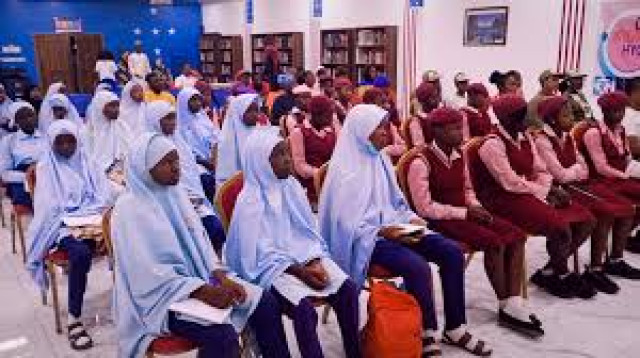WaterAid Nigeria with funding from DP World in partnership with Women Development Association for Self Sustainace(WODASS) and collaboration with the Bauchi State Primary Health Care Development Agency and State Universal Basic Education Board(SUBEB) has commemorated the menstrual Hygiene day through the Intervention of Sanitary pad banks and formation of Environmental Health clubs for sustainance in four secondary schools in Misau local government area of Bauchi State.
It was that the aim of the intervention was to advocate to the state government to scale-up the provision of sanitary pads in all schools in Bauchi state as well as promote hygiene practices among school girls.
To mark the day, sensitization and awareness of menstrual hygiene was carried in four schools in Misau local government.
They include Junior Secondary School Fawari Misau, Government Girls Junior Secondary School Sabongari, Government Girls Secondary School Hardawa and Government day Secondary School Hardawa
Speaking at the end of the Sensitization programme, a representative of SUBEB in the state, Hajiya Talatu Yakubu stated that education for school girls on menstrual hygiene and awareness was necessary in order to promote the dignity of girls in school as they study.
She mentioned that poor hygiene during menstruation can result in infections that may harm a girl's reproductive organs, potentially leading to infertility, social stigma, and reduced confidence among peers.
"When girls reach the age of 10 and older, they begin experiencing the changes that come with womanhood.
It's crucial to educate them about the significance of maintaining menstrual hygiene because a woman's dignity is linked to the start of menstruation. Therefore, girls need to be aware of their bodily changes and how to look after themselves," she emphasized.
During a practical demonstration on the use of sanitary pads, Hajiya Talatu advised that girls should not wear the same pad for more than three hours, as prolonged use can lead to clothing stains or infections.
The program's facilitators, Mrs. Lasu Bako Galadima and Hajiya Suwaiba Lawn from WODASS, also stressed the importance of educating school girls about menstrual hygiene. They highlighted the significance of early awareness and self-care in promoting hygiene and educating their peers.
At Government Girls Secondary School Hardawa, students Sabrina Lawal and Hafsat Mohammed expressed gratitude for the intervention of sanitary pad banks and the establishment of Environmental Health clubs in schools.
They believe that these initiatives will greatly assist girls in managing their periods and enable them to focus on their studies while at school.




















